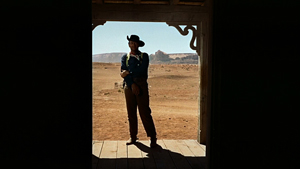Western civ
Philosopher Robert Pippin sees life on the frontier as a window into Americans' political psyche.
By Ethan D. Frenchman, AB'08
Photography by Warner Brothers

John Wayne's character in The Searchers raises complicated questions of kinship and national identity.
In the first shot of John Ford's The Searchers, frontier wife Martha Edwards steps out from her darkened home into the searing light of the Texas plain. The year is 1868 and Martha finds her brother-in-law, Ethan, returning from war in his Confederate grays. But the reunion is soon cut short by a violent raid. Ethan, played by John Wayne, spends the next several years madly hunting the Comanche war chief who massacred Martha and her family and took his niece, Debbie, as a bride.
At the film's end, the camera peers out from the darkness of a seemingly happy home. With the help of his part-Indian adopted nephew, Martin, Ethan has safely recovered Debbie, who goes to live with family friends. As she and her new caretakers celebrate a reunion years in the making, Ethan looks on from outside, then saunters toward the Western buttes, closing what philosophy professor Robert Pippin calls "one of the greatest and most ambitious films ever made."
It would be easy for viewers to have high hopes for Debbie's new farmstead, writes Pippin in his 2010 book Hollywood Westerns and American Myth: The Importance of Howard Hawks and John Ford for Political Philosophy (Yale University Press). Ethan, who harbors an unmatched hatred for the Comanche people and anyone touched by them, returns Debbie and then departs alone. The couple who takes her in will soon marry their own daughter, Laurie, to the mixed-race Martin. This new generation will inherit an ornate home with riches of horses-and the chance to create a prosperous and multiethnic America.
But the camera's retreat into darkness at the end of the film, Pippin argues, is an arresting symbol of the community's, and the nation's, blindness. Although Ethan's racial cruelty is exposed, Pippin reminds readers that Laurie, despite her marriage to the "one-eighth Indian" Martin, shares Ethan's virulent racial hatred of the Comanche, leaving open questions about the fate of her marriage and the possibility of national harmony.
The Searchers' treatment of kinship, community, genocide, and self-knowledge mark both the vision of John Ford and the ambitions of the Western genre, says Pippin, whose book stems from three Castle lectures he gave at Yale in 2008. The lectures, which eventually became the book's central chapters on Red River (1948), The Man Who Shot Liberty Valance (1962), and The Searchers (1956), explore the interaction between personal passions and the demands of American citizenship.
Beyond entertainment, the films have much to offer philosophy, Pippin says. "I was dissatisfied that the central question of political philosophy for the past 50 years or so has been the question of legitimacy-that is, whether the exercise of the coercive power of the state could be justified." That's "not really the question that used to occupy the great political philosophers of the past," he argues. Instead, thinkers like Plato, Rousseau, and Hegel delved into issues of political psychology: how strangers bond, form a body politic, and see each other as citizens. Pippin places films such as The Searchers in that long tradition.
He suggests that as works of art they deserve a place next to Faulkner, Ibsen, and Shakespeare, and as works of philosophy, they reflect issues central to Americans' psychology. Characters in Westerns such as The Searchers wrestle with love, fear, desire for pleasure, and self-love in a way that sheds light on how political communities form. Like directors Howard Hawks and Ford, says Pippin, "political philosophers were concerned with how to understand the role of such passions in the practices of ruling and obeying."
In American stories of the Western frontier, passions are enflamed by civil war, lawlessness, and rising commercial opportunity. "An awful lot of Westerns are about the end of the West, the life on the frontier prior to law and order, and the transition from lawlessness and martial and heroic virtues to a domestic, liberal, democratic, and bourgeois way of life," says Pippin. This transition can be quite messy, but Westerns succeed as philosophy because the films portray "human life as it is lived" rather than assessing it rationally.
In the Hawks film Red River, John Wayne plays the tyrannical and charismatic Tom Dunson who, while leading a 400-mile cattle drive from Texas to Missouri, is ultimately replaced through mutiny by a more fraternal and democratic order. As in The Searchers, argues Pippin, the transition is incomplete. Matt, the leader of the mutineers, succeeds because he violates a contract and enlists the help of a hired gun. Although Matt prefers to talk instead of fight, he "simply represents the modern, equally but differently tough side of Dunson, not his alternative," says Pippin. The end of the movie warns that while "the era of heroes is over, no longer necessary in the world of bankers," viewers should remember that "the bourgeois world is itself a world of civilized and hidden ruthlessness."
Characters in Westerns are not the only ones who fall victim to blindness. Pippin attributes the films' enormous popularity in part to a uniquely American nostalgia for the heroic virtues of the lone gunfighter: "In our taste for Westerns, we obviously like or want to believe that we did not completely make this transition" to a prosaic world, says Pippin, a "kind of self-mythologization that is interesting."
(A list of Pippin's Top Ten best Westerns appears in the Core, the College magazine and supplement to the July-Aug/10 Magazine.-Ed.)
Return to top
